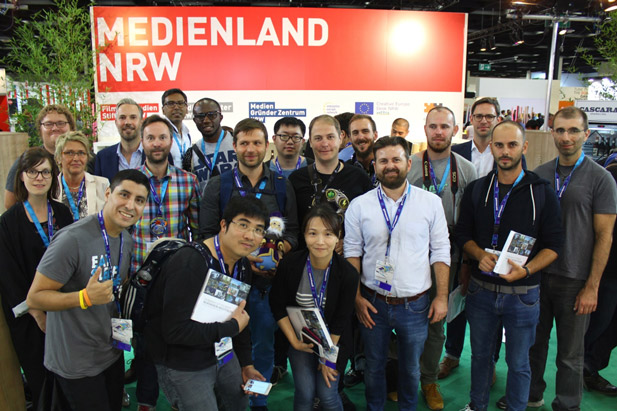UOIT game development researcher wowed by electronic showcase in Germany
Dr. Bill Kapralos hoping to cultivate new international opportunities for UOIT students
September 6, 2016

Pushing new directions in one’s area of research often involves being open to new ideas. Scholars who are prepared to ‘think outside the box’ end up discovering different challenges and opportunities that can be applied in their own laboratory.
In this spirit of broadening research horizons, University of Ontario Institute of Technology (UOIT) game development researcher Bill Kapralos, PhD travelled overseas in August to participate in a weeklong exploration of how digitization is changing Germany’s society and economy.
The Faculty of Business and Information Technology (FBIT) Associate Professor was among 18 international delegates invited by the German government to take part in Electronic Start-up: Industry 4.0 in Germany, Country of Innovation. Other countries represented in the visitors’ program included Korea, Latvia, Nigeria, Philippines, Romania, Russia and Taiwan, among others.
“Germany is keen to position itself as a place for innovation, with thriving cultural and creative sectors,” says Dr. Kapralos. “Germany recognizes the growth potential for new business and jobs if the country develops and supports its digital industry.”
- Fast fact: Canada is home to a thriving digital media industry, recognized as a world leader in video game development, animation and visual effects. As of 2012, Canada’s digital gaming industry was ranked as third largest in the world (source: The Canadian Trade Commissioner Service, Government of Canada).
In Cologne, Dr. Kapralos attended Gamescom, the world’s largest trade show featuring Germany’s dynamic computer games sector. The delegates also visited respected German research institutions such as the Fraunhofer Institute for Telecommunications/3IT @ Heinrich Hertz Institute and the Hasso Plattner Institute, industry sites Fab Lab Berlin and EyeEm, and government organizations such as Germany’s Federal Ministry of Transport and Digital Infrastructure.
“This opportunity has opened some new academic channels for research collaboration,” says Dr. Kapralos. “I am also talking with folks from the gaming industry about possibly offering internships to our gaming students and about participating in our university’s capstone program whereby our gaming students would work with German gaming companies.”
Dr. Kapralos also intends to capture the energy of Germany’s young startups, academic and research institutions, and exciting (game) founder’s scene, and apply that to his courses and serious games research at the university.



